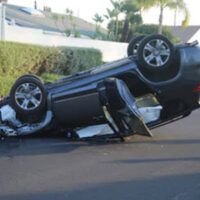Rollover Accidents Caused by Vehicle Defects

While most car accidents have a wide range of causes, certain types of collisions can usually be linked to a specific reason. Rollover accidents, for instance, are often the result of a vehicle defect. Filing claims based on these types of collisions can be difficult, as it usually requires the filing of a lawsuit against the vehicle or part manufacturer. It is also not uncommon for there to be more than one contributing factor to defect-related rollover collisions, which can make it difficult to assign liability. To ensure that you have the best possible chance of recovering damages for your own rollover accident, please contact an experienced Fort Lauderdale automobile defect lawyer who can advise you.
Potential Defects
Although any one defect could cause a rollover accident, most involve one of the following problems:
- Electrical system issues;
- Defective tires;
- Software defects;
- A defective suspension;
- Steering wheel problems; and
- Defective brakes.
While some of these defects are the result of problematic designs, others could be linked to a defect in the production process. In other cases, a software defect could cause a vehicle’s programming to malfunction, or the programing itself could suffer from complex errors. Whatever the cause of the defect, the manufacturer responsible for designing, manufacturing, or producing the vehicle could be held liable. Furthermore, in the event that a vehicle was damaged during transit, or while on a car dealer’s retail lot, the shipping company and dealership could also be held liable for a portion of the injured party’s losses.
Electrical System Issues
Electrical system errors are some of the most common causes of defect-related rollover accidents, as these types of problems can affect the ability to control the vehicle. In other cases, the error could be internal and not visible to the operator. Determining the exact cause of an electrical system defect can be complicated and requires a thorough understanding of the mechanics of the vehicle, as well as its software. For this reason, retaining an expert may be necessary to help determine and prove the existence of an electrical system defect.
Tire Failure
Rollover accidents can happen at any time, but occur when:
- A vehicle is traveling at high speeds and turns sharply;
- One side of a vehicle climbs up on an incline;
- A vehicle loses traction and skids; or
- A vehicle’s wheel strikes a solid object, causing it to spin out.
All of these problems can result from tire failure, whether the problem is with the wheel, the tire’s tread, or another tire component. Vehicle manufacturers are required to comply with certain standards when equipping their vehicles with tires, but many fail to do so. When this causes a blow-out or another form of tire failure, the at-fault manufacturer can be held liable for damages.
Vehicle Suspension Problems
All vehicles have a suspension system that is responsible for keeping cars stable while they drive. When this system fails, a vehicle can become impossible to control, leading to a rollover. These problems are especially dangerous in vehicles with high centers of gravity, such as SUVs, which are already more prone to rolling.
Call Today for Legal Support
Please contact Boone & Davis at 954-566-9919 today to speak with an experienced Fort Lauderdale auto defect attorney about filing a claim against the manufacturer whose negligence caused your own collision.
Resource:
safercar.gov/Vehicle-Shoppers/Rollover/Causes
